The following report is now a complimentary offering from MEMRI's Jihad and Terrorism Threat Monitor (JTTM). For JTTM subscription information, click here.
On November 6, 2024, Gazan Salafi cleric Salman Al-Dayah, a professor of Islamic jurisprudence and the former dean of the faculty of shari'a and law at Gaza's Islamic University, published six essays titled "O Politicians, Stop This Expansion." The first essay ran six pages, the last four, and the remaining four two pages each.[1]

In the essays, Al-Dayah rejected statements by Hamas leaders justifying the group's October 7, 2023 invasion of Israel despite the high Palestinian toll, declaring that shari'a mandates waging jihad to defend Muslims' lives, honor, and religion, while a jihad that is expected to result in the loss of Muslim lives and violation of honor is illegitimate. The cleric urged Hamas leaders to focus on the welfare of Gazans by being "humble" and establishing a government that unites Palestinians and provides for their needs, while refraining from antagonizing a much more powerful Israel. He expressed hope that the group's remaining leaders will make such concessions before winter to minimize Gazans' suffering.
The "Without Title" Telegram channel, linked to Al-Qaeda supporter Fu'ad Al-Khatib, who may be based in Gaza, described Al-Dayah as an important "Salafi figure" who works at the "Islamic University which belongs to Hamas" and is known for his charitable and religious activity. Noting that Al-Dayah is "one of the enemies of the jihadi stream," the channel claimed that Hamas has used him to combat Salafi-jihadis in Gaza. Calling the cleric "one of the closest associates of Hamas," the channel noted that as a "voice of the scholars in Gaza," he has "joined the caravan of those who condemn the Hamas militias for their accursed [Al-Aqsa] Flood," claiming that his fatwas have "resonated greatly inside and outside of Gaza" and questioning if anyone will be able to discount his view by claiming that he is "against the doctrine of jihad against occupiers."[2]
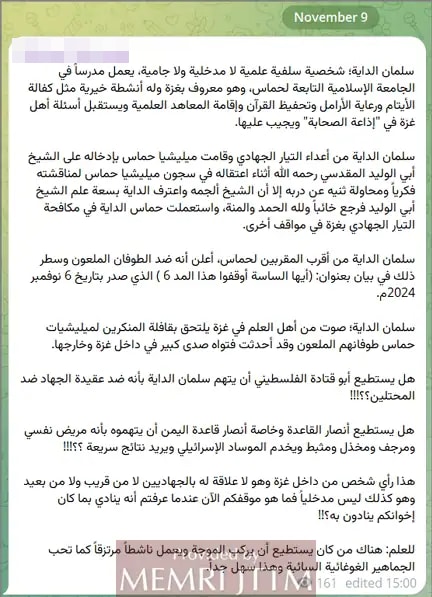
UK-based Iraqi Salafi cleric 'Abd Al-Haqq Al- Turkmani similarly wrote that Al-Dayah is known as the "mufti of Gaza" and described as "one of its greatest scholars." As evidence of Al-Dayah's good relations with Hamas in the past, Al-Turkmani noted that he previously served as Minister of Awqaf [Religious Endowments] in Hamas' government and was mufti of Hamas' Hajj delegation several times.[3]
Hamas Leaders Should Have Predicted Devastating Consequences Of 10/7 Attack Which Make Their Jihad Illegitimate, Should Establish Unity Government That Cares For Gazans' Needs
In Al-Dayah's first essay, he responded to remarks by senior Hamas official Osama Hamdan directed at "some of the cowards and weaklings" who ask: "Wouldn't it be safer for us not to fight … rather than losing these lives?" Hamdan stressed that while Palestinians will inevitably be killed by Israel, it is better to sacrifice one's life as "a free resisting mujahid." Calling Hamdan "my brother," Al-Dayah asserted that according to shari'a, jihad may be waged to repel aggression against Muslims' religion, lives, honor, or property. The conditions for jihad include faith, unity, power, and the ability to provide fighters with their needs and grant them refuge "far from inhabited homes, residential towers, crowded schools, and packed hospitals," while doing the utmost to protect noncombatants. If it is "considered most likely" that the conditions or aims of jihad are lacking – e.g. if jihad will increase loss of Muslim life – then shari'a demands to refrain from waging it. According to Al-Dayah, "the leaders and commanders of our country" should have been able to foresee the devastating consequences of "the October 7 event" based on Israel's response to previous clashes, in which "none of the goals of provoking, angering, and seeking war with their enemy which the resistance announced at the time were achieved," but only brought "terrible negative consequences" of loss of life and property, destruction of the "necessities of life," and crackdowns on increased numbers of prisoners.
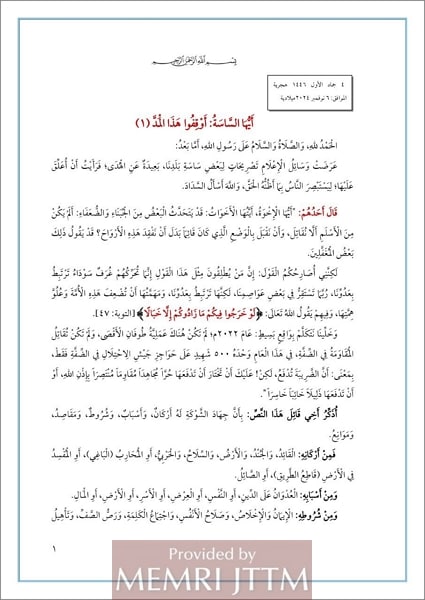
The first page of the first essay
Citing Quranic verse 8:66, Al-Dayah ruled that shari'a permits mujahideen to retreat when facing an enemy more than twice their number – although fleeing from battle under other circumstances is a mortal sin – and certainly allows them to refrain from attacking an enemy who overwhelmingly outnumbers them. Addressing "our honored brother" Hamdan, the cleric quoted several medieval Islamic jurists, who all ruled that jihad should not be waged if it is likely to result in defeat.
Lashing out at Hamdan for speaking with "the joy of one who achieved victory that attained safety and security for your people … freed their prisoners … and removed injustice from Al-Aqsa," Al-Dayah declared that "your entire people have become mentally or physically ill, maimed in body … or criminal in nature … or addicted to painkillers and drugs, or repelled by religious people, or an apostate from religion," besides for the "astonishing numbers" of martyrs, widows, and orphans. Even if the war ended tonight, "its suffering would last for decades."
The Gazan cleric told Hamdan that he had hoped the jihad would bring about unity, strengthen cooperation between Gaza and Arab countries, create a "fatherly government that does not belong only to one party," as this would have been "the most powerful weapon in expediting relief close and repelling distress." He lashed out at Hamdan for accusing people of collaboration and cowardice merely for saying "If only we had remained in the state we were in before this calamitous war," asserting that most Gazans feel the same "after their homes have disappeared, their loved ones died, and they experienced various types of suffering."
Lives Of Civilians Are More Important Than Those Of Commanders And Fighters; Leaders Who Harm The Public Face Divine Retribution
The second essay responded to another statement of Hamdan's, in which he declared that the real "sacrifices" are those of slain mujahideen and commanders, not the "martyrdom" of women and children. Al-Dayah described this viewpoint as "far from the truth," declaring that Islamic scholars have viewed the role of military commanders and fighters as "guarding the interests of their ummah [Islamic nation]" by defending their religion, lives, honor, and possessions, and have seen "the interests of the common people [as] broader and greater" than those of their leaders. A leader is praised only for advancing the good of the masses; one who acts otherwise "does not escape the anger of the Omnipotent" or "the curse of the Prophet."
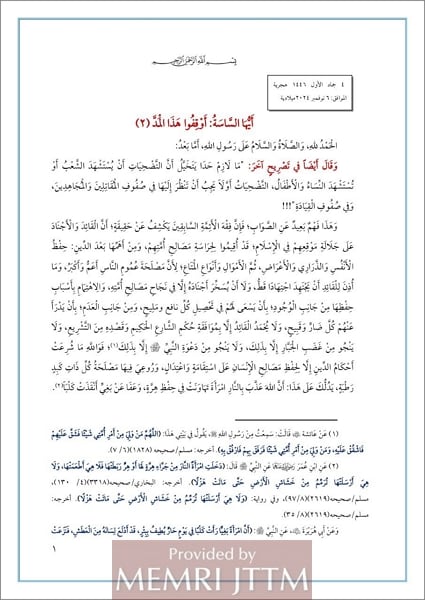
The beginning of the second essay
Mass Deaths Of Gazans Have Achieved No Benefits For Palestinians
In the third essay, Al-Dayah rejected the claim by another senior Hamas leader, Khaled Meshaal, that the group's losses are "tactical" while Israel's are "strategic,"[4] disagreeing that the deaths of Palestinians in the West Bank and Gaza are part of the group's strategy to achieve victory and the slain can be replaced. The Gazan cleric responded forcefully by asserting that none of the Salaf [early generations of Islam] understood such a thing. He asserted that while the scenes of death and destruction in the Gaza Strip have led to opposition to Israel by world governments, charges of genocide against it in international courts, and student protests condemning it, nothing has changed, as "the fleets of planes loaded with ammunition and weapons of destruction continue to land in the airports of those waging war [i.e. Israel]." According to Al-Dayah, "what … the politicians see as an accomplishment has not affected those waging war and will not prevent them from their ferocious annihilation of lives and possessions."
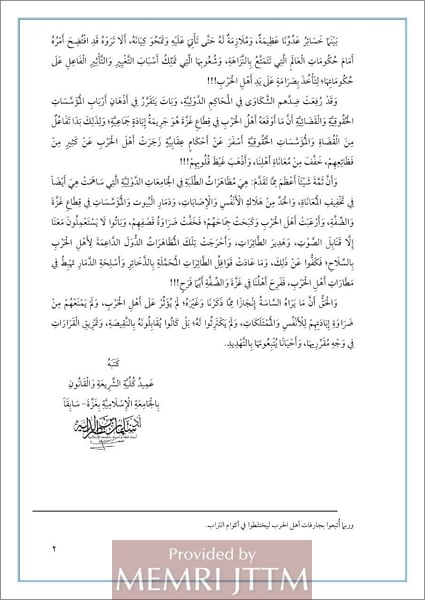
The second page of the third essay
Hamas Leaders Are Blameworthy For Launching Attack That Caused Thousands Of Deaths And Made Muslims "Apostatize"
The fourth essay rejects Hamas leader Yahya Sinwar's remarks that Gazans are prepared to sacrifice their lives like the People of the Ditch mentioned in the Quran, who were killed for their belief in Allah. Al-Dayah asserted that the story of the People of the Ditch cannot be compared to "this calamitous war" as the war initiated by Hamas caused consequences contrary to that episode. According to the Gazan cleric, the ongoing war has caused "a segment of the population to apostatize from the religion, and a wider segment to increase their aversion and hatred of the religious who caused this calamity," not to mention the many who have been killed, maimed, or imprisoned. Al-Dayah quoted 14th-century Islamic scholar Ibn Taymiyah: "There is no opinion more blameworthy than one which caused the bloodshed of thousands upon thousands of Muslims, and their killing brought about no benefit to the Muslims, neither in their religion or material affairs, but rather caused good to diminish and evil to increase."
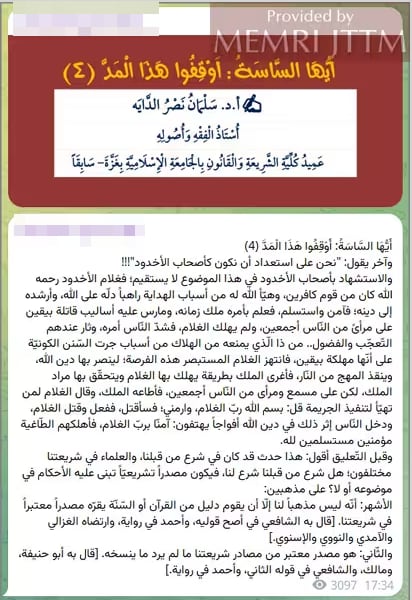
The beginning of the fourth essay
Hamas Is Responsible For Gazans' Welfare; Using Civilians As Human Shields Is The Opposite Of This Duty
In the fifth essay, Al-Dayah rejected the claim of Hamas Political Bureau member Mousa Abu Marzouk that most Gazans are refugees for whose welfare Israel and the United Nations are responsible,[5] dismissing this as an evasion of responsibility by Hamas for the catastrophic results of its jihad. The Gazan cleric asserted that "the management of the Strip is under their authority and part of their responsibility," ruling that shari'a obligates the group to work towards the welfare of its population. The way Hamas wages jihad, by "using the people of the Strip as human shields," has led Israel to "not hesitate to bomb any place where they are holed up … regardless of the enormity of the disaster resulting from their bombing." Al-Dayah accused Hamas commanders of ignoring the fact that they are "under complete siege" and receive no help from neighboring countries, making any "confrontation with their enemy a constant failure." He noted that the Prophet Muhammad forbade his Companions from antagonizing his enemies during the Battle of the Trench when "they were besieged like us," and that Islamic scholars condemned fighting while ignoring the consequences.
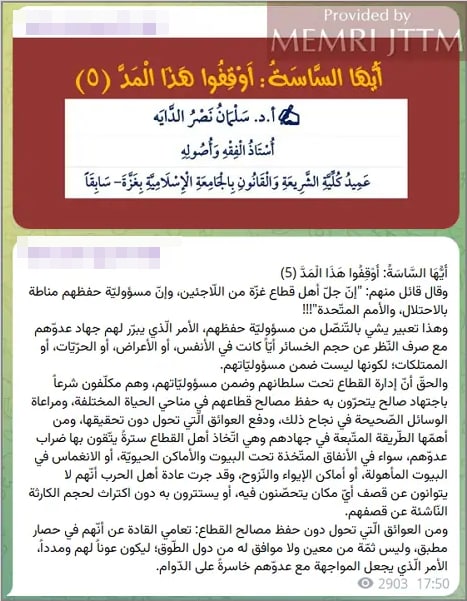
The beginning of the fifth essay
Hamas Has Achieved None Of Its Goals And Should Never Have Invaded Israel; Its Leaders Must Step Down To Help Gazans Before Winter
In the sixth and final essay, Al-Dayah objected to remarks by Ghazi Hamad, a member of the Hamas political bureau and ceasefire negotiation team, that the Palestinian people is Hamas' "main capital" and that the group's goals will be achieved "even if the occupier killed 20,000 or 100,000 more." The cleric declared indignantly that Gazans do not "belong to this man and his friends," accusing Hamad of ignoring human dignity and the fact that "his method has not achieved any of the declared goals of his jihad" other than bringing the Palestinian cause to the forefront of world consciousness. Noting that Hamas and his "brothers" demand nothing more than the withdrawal of Israeli forces from the Gaza Strip, Al-Dayah declared that "jihad was only ordained to protect lives and their religious, personal, and financial benefits … and jihad was not ordained in case of inability to achieve that."
Addressing Hamas leaders, Al-Dayah urged them to "fear Allah" and remember that "the extinction of the world is less significant to Allah than the killing of one person unjustly, whether killing directly, indirectly, or by abandonment and negligence." He continued: "If only you would be humble and give precedence to the interests of the masses … and agreed to put forward a government composed of people with humanity, excellence, virtue, paternalism, holistic view, and international acceptance, with all of Palestine behind them … so that it can expedite assistance to our people in shelters and displacement tents before the winter comes."
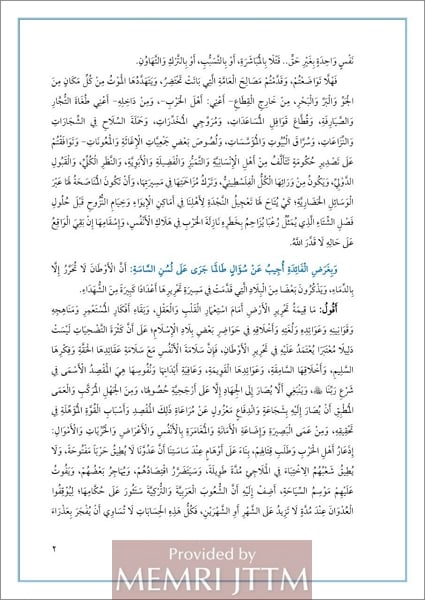
The second page of the final essay
Responding to an argument often advanced by Hamas leaders that "homelands are only liberated through bloodshed" and the deaths of large numbers of martyrs, Al-Dayah first asserted that "liberating land" has no value if "the heart and mind are colonized" by western culture," as they are in many Muslim countries. Furthermore, because safeguarding life is a supreme value in Islam, proceeding to jihad while ignoring the likelihood of its success is "complex ignorance and utter folly."
Al-Dayah lashed out at "our politicians' illusions that our enemy cannot endure an open war and their people cannot endure hiding in shelters for a long period of time, and their economy will be harmed, some of them will emigrate, and they will lose the tourism season. Besides that, the Arab and Turkish peoples will revolt against their rulers to end the aggression after a period of no more than a month or two." He declared: "All these calculations are not worth one Gazan virgin being violated and becoming pregnant from their barbarians, or one prisoner being forcibly sodomized, much less the death of tens of thousands of people, accompanied with the humiliation of the population of the Strip at large."
The Gazan cleric asserted that when the goals of jihad are not achievable, the ummah must "seriously endeavor to achieve the means of pride and glory" by uniting and abandoning factionalism, protecting Muslims' interests, and calling those who violate Islam to follow Islamic morals. They must also "not frighten and antagonize the enemies of the ummah during a state of weakness and siege." Al-Dayah urged those following events in Gaza and the West Bank not to focus on Hamas' "excess bravery" without looking at "the immensity of the calamity and severity of the disaster," noting that the caliph 'Umar bin Al-Khattab refused to appoint Al-Bara' bin Malek to lead his army, fearing that his great courage would cause him to endanger his soldiers' lives. Al-Dayah also quoted 9th-century jurist Al-Shafi'i, who ruled that a Muslim ruler should appoint a military commander who "will never lead the Muslims into danger" or command them to enter a situation where they will be killed. If he does so, "he has done wrong and must beg Allah's forgiveness," and his soldiers should not obey him.
Al-Dayah asked Allah to make Hamas leaders accept his words soon, before winter sets in.
Condemnation of Hamas' invasion of Israel and continued war against the Jewish state has been leveled by clerics opposed to the group, such as Egyptian-born Canada-based pro-Al-Qaeda ideologue Tariq Abdelhaleem. Abdelhaleem has harshly condemned Hamas in multiple social media posts published over the course of the ongoing war, asserting that jihad does not mandate starting a war "that will result in the complete annihilation of your people" and that Hamas leaders should be publicly executed for sacrificing the lives of thousands of Gazans to advance Iranian hegemony in the Middle East.[6] However, Al-Dayah seems to be the first prominent cleric living in Gaza and not affiliated with Hamas' rivals to issue a ruling invalidating the group's jihad.
[1] Telegram, November 6, 2024.
[2] Telegram, November 9, 2024.
[3] November 8, 2024.
[4] See MEMRI TV Report: Leader Of Hamas Abroad Khaled Mashal On Anniversary Of October 7 Attack: Our Losses Are Tactical, Whereas Our Enemy's Losses Are Strategic; Jihad With Money Is No Longer Enough, Muslims Should Wage Jihad With Weapons, October 7, 2024.
[5] See MEMRI TV Report: Hamas Official Mousa Abu Marzouk: The Tunnels In Gaza Were Built To Protect Hamas Fighters, Not Civilians; Protecting Gaza Civilians Is The Responsibility Of The U.N. And Israel, October 27, 2023.
[6] See MEMRI JTTM Reports: Canada-Based Pro-Al-Qaeda Cleric Lashes Out At Hamas And Hizbullah: Hamas Leaders Should Be Executed, Hamas Will Be ‘Worst Dictatorship In Middle East’ If It Remains In Power, Hizbullah Fights Israel To Advance Iran’s Interests, July 10, 2024; and Canada-Based Pro-Al-Qaeda Cleric Lashes Out At Yahya Al-Sinwar, Saying He Was Appointed By Iran To Sacrifice Remaining Gazans, A 'Disgusting Repetition' Of Islamic State (ISIS) 'Imaginary Caliph'; Jihad Is The Only Path To Recoup Rights, August 8, 2024.




